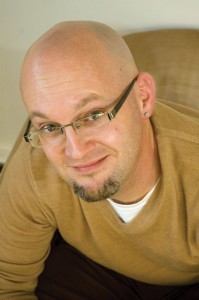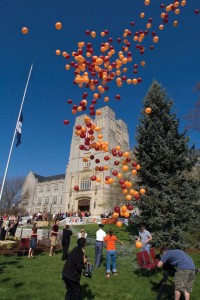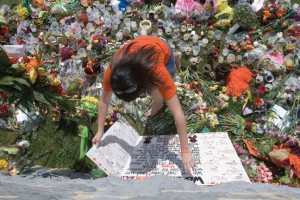
 Jim Pace, Co-pastor, New Life Christian Fellowship, Blacksburg, VA
Jim Pace, Co-pastor, New Life Christian Fellowship, Blacksburg, VA
By Ronald E. Keener
When Seung-Hui Cho began a killing spree on the campus of Virginia Tech, ending in 32 staff and students killed and others wounded, on April 16, 2007, Jim Pace was sitting in a coffee shop he frequents about a block off campus. Pace is co-pastor of New Life Christian Fellowship in Blacksburg, VA, that has about 1,000 attendees, many of them students.
“At first,” he says in telling the story that put him squarely in the middle of the events in coming days, “we just heard the police sirens and loud speakers telling everyone to stay inside, a gunman was on the loose. It seemed like one or two people had been shot, that was it.
“It was about an hour or two later when I had gone home, that my wife saw on the news that the death count was already in the 20s. She started crying and I felt numb. We got the other pastors together, prayed a bit and started pulling together some plans. We then called a staff meeting, got people on the task of finding out if our people were safe; with a church of our size and the death count rising like it was, we were very much afraid that all of our people wouldn’t be.
“We started planning a vigil and by then we were being contacted by the media. It was decided that I would handle the media and then everyone got very busy.”
Pace, 38, grew up in Alleghany County two hours away, and was graduated from Virginia Tech in 1994. He has written a book, Should We Fire God?: Finding Hope in God When We Don’t Understand, that comes out this month from FaithWords. He gave an interview to Church Executive about those events three years ago.
Larry King’s people called your cell phone. Over the coming days, what programs were you on and what was it that they were asking?
Anderson Cooper 360, CNN’s American Morning, Good Morning America, the 700 Club, local CBS and NBC affiliates. Our first Sunday Gatherings after the shootings were covered on CNN and Larry King Live. Also some international media. Most of the questions dealt with how to go through a process like this and maintain your faith; what did this say about God’s protection of us?
 They asked how the campus was handling everything and what had we learned as we walked through it all. I took e-mail questions from all over the U.S. on Good Morning America that dealt with a number of issues.
They asked how the campus was handling everything and what had we learned as we walked through it all. I took e-mail questions from all over the U.S. on Good Morning America that dealt with a number of issues.
One of them was from a 14-year-old who said that she didn’t feel safe after hearing about the shootings. Diane Sawyer then turned to me, on live TV, and asked me how I would answer her! This was the day after the shootings and I had probably slept about three hours the night before. I was on a number of radio programs, the largest being GodTalk out of Winnipeg, Canada.
I did feel a bit like a press secretary in those unfolding weeks. I felt that many, many people had questions about how God handled himself. Fair questions and good ones, but they were often pointed and very direct.
The introduction of your book begins with the words: “Maybe our world is violently spinning out of control and those of us with faith in God are just the last ones to get the memo.” In the past three years there have been other horrific events, more recently the Fort Hood shootings (of man) and the Haiti earthquake (of nature). What should we make of these events?
I think our world is broken on every level. There really isn’t a component of our existence at this point where things are going precisely the way that God intended. I believe that one day Jesus will return and recreate us, the planet, everything, into what he originally saw it to be.
The Scriptures refer to this as his coming glory, and it talks about it quite a bit. I also believe that when we become followers of Jesus, he taps us to join him in that redemptive work now. This world isn’t just some gigantic waiting room where Christians wait until they die so the fun can start. Not at all; we are called to join with Christ and continue the work he began.
For now it comes as no surprise that instead of loving one another, we hurt one another. Instead of our planet supporting us as it was intended, it shudders and shakes itself. Our fallenness is very real. The consequences of that fallenness are just as real.
What were the questions students asked, and how did you answer them?
At first it was, “I cannot find my friend/Resident Advisor/ professor. Facebook and MySpace were lighting up with statuses like “I’m okay!” And then the awful math started to happen for those who hadn’t been heard from.
A friend of mine was on the Rescue Squad that was tasked with removing the bodies. He said one of his worst memories was, as they were loading up all these bodies, their cell phones were ringing like constantly. People trying to find out if they were safe or not. Awful.
Did you find that the “typical” responses rang a little hallow as you repeated them? Did they seem too much like “God-talk” and a little inadequate given the circumstances?
We have never really been a “typical God-talk” type of church. We have very willingly embraced the difficulties of following Jesus in our world today. We’ve invited questions and doubts and walked through them in as honest a way as we can. Our church has many weaknesses, but I would call this one of our strengths. So, in the aftermath, we didn’t really change anything. We were the way we have always been, just in a more concentrated manner.
Were there ways in which members of the congregation got involved in reaching out in addressing the grief and search for answers?
Absolutely. This was one of the most amazing aspects of this whole time. We had our leaders, many of who were in their early twenties, step up in striking ways to help one another cope. Sometimes in large groups and other times in small clusters, they just walked through it together — asking questions of the one another, the Scriptures, us as a staff and pastor team. I loved their honesty and their faith as they did that.
April 16 that year was the day that “normal” changed for you, you write. In what several ways did that
happen?
In Romans Paul asks the rhetorical question of “what can separate us from God’s love?” He asked if calamity, suffering, you name it, could. And his clear and loud answer was nothing. Nothing can separate us from the love of Christ toward us. We had the opportunity to see the truth of that on a scale that none of us would have ever asked for. That level of commitment had always been the case, but in the aftermath of the shootings, we experienced it first hand.
We learned what so much of the world is unfortunately acutely aware, that terrible suffering and the love and concern of God intermingle. That is now a part of our corporate and personal legacy.
Is there a way for a pastor to be prepared to some degree for an event of human or natural disaster, and to be able to give comfort to others?
The only possible means of preparation I can suggest is to walk closely with Christ. You simply cannot be prepared for what will happen. We were keenly aware that there was no play book for how we should walk through those first few months.
 As for answers specifically, the only leg up on some people I might have had was that I have been a questioner my whole life, including the last 17 years that I have been a follower of Christ. I have wondered, asked, prayed, and reflected on these types of issues for years. So I at least was somewhat prepared with the beginnings of some answers. But, beyond that, no, you have been pulled into the current with everyone else.
As for answers specifically, the only leg up on some people I might have had was that I have been a questioner my whole life, including the last 17 years that I have been a follower of Christ. I have wondered, asked, prayed, and reflected on these types of issues for years. So I at least was somewhat prepared with the beginnings of some answers. But, beyond that, no, you have been pulled into the current with everyone else.
What sense have you made of the shootings, if any, over these three years?
The only sense I can make might seem fairly basic. Our world is broken, and it will hurt all of us at some point or another.
While God does protect us from some of it, there are parts that we all must walk through with him. The secret is that he is already in those horrible places and he gives us the chance to join with him in reclaiming a creation that he desperately loves and that has left him. In short, the shootings happen, because he must let them happen, for now. But we can be a part of the renovation of the creation.
How has your faith been changed in the past three years?
I would say the processes that were already going prior to the shootings have continued after. I have seen what suffering looks like from a very close vantage point. The images that I have seen repeatedly with other countries and cities in the caption, now have had mine.
I have had to simply sit with people that I cannot realistically expect to meaningfully help, at least not in the short term. At the same time, I have seen people that many churches wouldn’t even have in a leadership position of any kind demonstrate a power that can only come from Christ.
So I have been reminded of my weakness and God’s strength. I am better for that. But it has been tough getting there.
What’s the bottom line to the Virginia Tech shootings, and to other tragedies and wrongs of this world?
I try to remind people that a relationship with Christ doesn’t come with a “get out of suffering free” pass. God protects us from some, but not all. I try to remind them that this world is not the last thing, not the most important thing.
There is a world that continues beyond this one. I try to remind them that God is desperately looking for people who can be instruments of his grace and healing in a world that sometimes feels devoid of both. And I try to remind them that
God feels what we feel. He sees what we see. And this world has cost him as well. He has lost a son to the world’s evil. It doesn’t make it feel okay, but we can be sure God plays by his own rules.
You wrote that the Virginia Tech shootings might be seen as “the final example of a God who either doesn’t exist or is so impotent at his job, he’s hardly worth following.” How do you answer the often asked question, “Why, God?”
Maybe I will take it from the other angle. God seems to value our freedom to a degree that we often miss or don’t appreciate. This means he is willing to allow the results of our freedom to play themselves out. I believe he does step in and prevent some things; I have seen that in my own life. But, while he doesn’t do that as much as I would prefer, I believe that he has demonstrated a commitment to walking with us through everything this world levels at us.
He does what I think he has to do with a creation that has been given freedom and has used that freedom to walk away and trash the place. He speaks individually to us all, wooing us at our heart level and offering us the choice to turn back to him. He never forces our hand. Then for those of us who return to him, he allows us to become a part of his wild redemptive plan for the rest of humanity.
Jim Pace’s blog: jimpace.org
New Life Christian Fellowship: nlcf.org.


